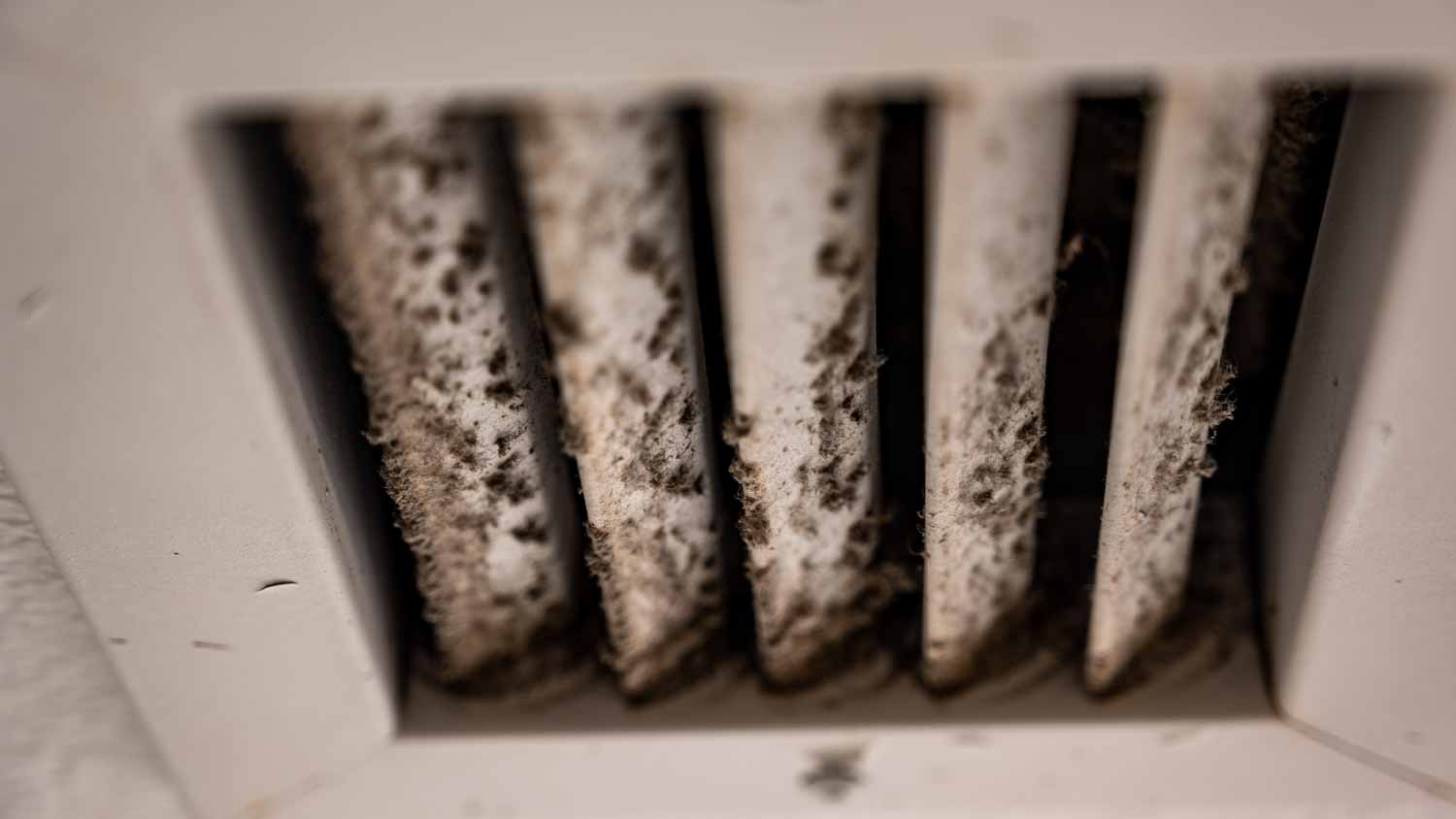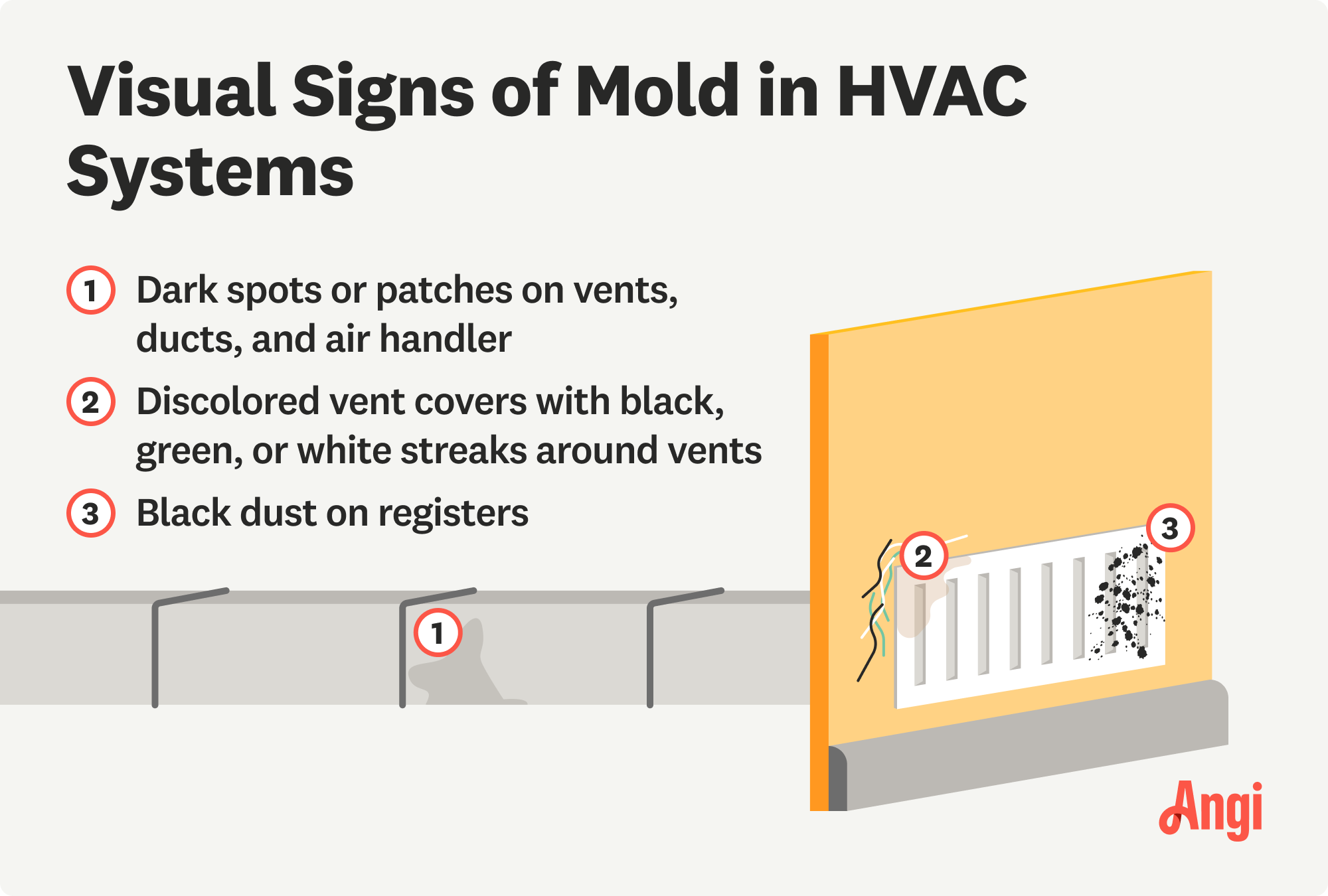
Inspections are an essential part of furnace maintenance. Prevent inconvenient breakdowns by budgeting for furnace inspection costs and repairs.
Mold can hide in the trickiest of places


The presence of mold in your HVAC system can lead to serious health issues.
While it is possible to remove mold yourself, it’s best to hire a professional.
A professional can get the job done safely and ensure mold doesn’t come back.
No homeowner wants to uncover mold in their home, and sometimes it’s hiding where we would least expect it. If you suspect mold is lurking in your HVAC, it’s best to act quickly. But is mold in an HVAC dangerous? The presence of mold can harm the health of household members and make your HVAC system less functional. Here’s what to know about mold in your HVAC system.
If mold is residing in your home’s HVAC system, you and any other residents—including your furry friends—are at risk. When mold grows in your HVAC system, it can spread spores throughout your living space, leading to respiratory issues, allergies, and worsening conditions like asthma. Certain types of mold, such as white mold or black mold, produce mycotoxins that can cause serious health problems.
Alongside health concerns, you also risk harming the structural integrity of your home by leaving mold unattended. Unchecked mold growth can damage your HVAC system and reduce its efficiency.
Some types of mold, such as black mold, can be harmful to your health. If you suspect black mold is in your home, hiring a mold remediation pro is the only method to completely remove it.

Detecting mold in your HVAC system early can help prevent health risks and expensive repairs. However, many homeowners don’t know what mold warning signs to look out for. It’s a good idea to hire an HVAC company near you to investigate any of the signs and symptoms of mold in your vents.
Musty odors: A persistent, damp smell coming from vents or near the HVAC unit is not a good sign. Don’t worry—once you remove the mold, you can take steps to get rid of the moldy smell.
Visible mold: Dark spots or patches on vents, ducts, or the air handler can indicate the presence of mold.
Increased allergy symptoms: Residents experiencing sneezing, coughing, or itchy eyes without another clear cause may have mold to blame for their suffering.
Poor airflow: Blockages caused by mold can reduce airflow from vents.
Frequent illness: If anyone in your house frequently experiences respiratory infections or headaches, mold may be the culprit.
Discolored vent covers: Look for black, green, or white streaks on or around vents.
Dust that smells musty: A dusty smell when the HVAC system is running could indicate mold spores.
Black dust on registers: Sometimes mistaken for dirt, black dust could be mold fragments.
Inconsistent heating or cooling: Mold can obstruct ducts, making some rooms harder to heat or cool.

With a little planning, you can prevent mold from growing in your air conditioner, HVAC system, and home in general. A good place to start is by taking these steps to ensure mold doesn’t form in your HVAC system.
Control humidity levels: Use a dehumidifier to keep indoor humidity below 50%.
Regularly replace filters: High-quality air filters reduce the amount of dust and debris that mold feeds on.
Clean the coils: Keep the evaporator coils clean to prevent condensation buildup.
Ensure proper drainage: Check and clear the condensate drain regularly.
Seal ductwork: Leaky ducts can introduce moisture and dirt, fostering mold growth.
Schedule professional inspections: Have your HVAC system inspected and cleaned annually by a professional.
Use UV light systems: UV lamps can inhibit mold growth inside the HVAC unit.
Understanding what causes mold is also a great way to prevent it from forming in your home.
From average costs to expert advice, get all the answers you need to get your job done.

Inspections are an essential part of furnace maintenance. Prevent inconvenient breakdowns by budgeting for furnace inspection costs and repairs.

What you’ll pay in Columbus, OH, for furnace repairs depends on many factors. Here’s a breakdown of what can go wrong and the cost to fix those issues.

Find out the average humidifier repair cost, what impacts pricing, and how to save. Get expert tips to budget for your humidifier repair.

An icy coil can create costly AC repairs. Learn what to do if the evaporator coil freezes to ensure your HVAC system operates efficiently.

Keep your home perfectly cool during the warm months. Learn about nine types of air conditioners and how to choose the right one for your home.

Discover the benefits of a DIY outdoor wood furnace forced-air system. Cut costs, reduce fire risk, and embrace renewable heat for your home.